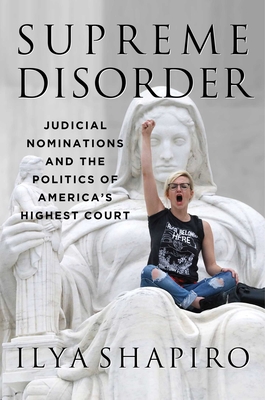Supreme Disorder: Judicial Nominations and the Politics of America's Highest Court

Supreme Disorder: Judicial Nominations and the Politics of America's Highest Court
The brutal confirmation battles we saw over Supreme Court Justices Neil Gorsuch and Brett Kavanaugh are symptoms of a larger problem with our third branch of government, a problem that began long before Kavanaugh, Merrick Garland, Clarence Thomas, or even Robert Bork: the courts' own self-corruption, aiding and abetting the expansion of federal power. Ilya Shapiro, director of the Cato Institute's Center for Constitutional Studies, takes readers inside the unknown history of fiercely partisan judicial nominations and explores reform proposals that could return the Supreme Court to its proper constitutional role. Confirmation battles over justices will only become more toxic and unhinged as long as the Court continues to ratify the excesses of the other two branches of government and the parties that control them. Only when the Court begins to rebalance constitutional order, curb administrative overreach, and return power back to the states will the bitter partisan war to control the judiciary finally end.
Politics have always intruded on Supreme Court appointments. But although the Framers would recognize the way justices are nominated and confirmed today, something is different. Why have appointments to the high court become one of the most explosive features of our system of government? As Ilya Shapiro makes clear in Supreme Disorder, this problem is part of a larger phenomenon. As government has grown, its laws reaching even further into our lives, the courts that interpret those laws have become enormously powerful. If we fight over each new appointment as though everything were at stake, it's because it is. When decades of constitutional corruption have left us subject to an all-powerful tribunal, passions are sure to flare on the infrequent occasions when the political system has an opportunity to shape it. And so we find the process of judicial appointments verging on dysfunction. Shapiro weighs the many proposals for reform, from the modest (term limits) to the radical (court-packing), but shows that there can be no quick fix for a judicial system suffering a crisis of legitimacy. And in the end, the only measure of the Court's legitimacy that matters is the extent to which it maintains, or rebalances, our constitutional order.
Politics have always intruded on Supreme Court appointments. But although the Framers would recognize the way justices are nominated and confirmed today, something is different. Why have appointments to the high c
PRP: 209.69 Lei
Acesta este Pretul Recomandat de Producator. Pretul de vanzare al produsului este afisat mai jos.
188.72Lei
188.72Lei
209.69 LeiIndisponibil
Descrierea produsului
The brutal confirmation battles we saw over Supreme Court Justices Neil Gorsuch and Brett Kavanaugh are symptoms of a larger problem with our third branch of government, a problem that began long before Kavanaugh, Merrick Garland, Clarence Thomas, or even Robert Bork: the courts' own self-corruption, aiding and abetting the expansion of federal power. Ilya Shapiro, director of the Cato Institute's Center for Constitutional Studies, takes readers inside the unknown history of fiercely partisan judicial nominations and explores reform proposals that could return the Supreme Court to its proper constitutional role. Confirmation battles over justices will only become more toxic and unhinged as long as the Court continues to ratify the excesses of the other two branches of government and the parties that control them. Only when the Court begins to rebalance constitutional order, curb administrative overreach, and return power back to the states will the bitter partisan war to control the judiciary finally end.
Politics have always intruded on Supreme Court appointments. But although the Framers would recognize the way justices are nominated and confirmed today, something is different. Why have appointments to the high court become one of the most explosive features of our system of government? As Ilya Shapiro makes clear in Supreme Disorder, this problem is part of a larger phenomenon. As government has grown, its laws reaching even further into our lives, the courts that interpret those laws have become enormously powerful. If we fight over each new appointment as though everything were at stake, it's because it is. When decades of constitutional corruption have left us subject to an all-powerful tribunal, passions are sure to flare on the infrequent occasions when the political system has an opportunity to shape it. And so we find the process of judicial appointments verging on dysfunction. Shapiro weighs the many proposals for reform, from the modest (term limits) to the radical (court-packing), but shows that there can be no quick fix for a judicial system suffering a crisis of legitimacy. And in the end, the only measure of the Court's legitimacy that matters is the extent to which it maintains, or rebalances, our constitutional order.
Politics have always intruded on Supreme Court appointments. But although the Framers would recognize the way justices are nominated and confirmed today, something is different. Why have appointments to the high c
Detaliile produsului








